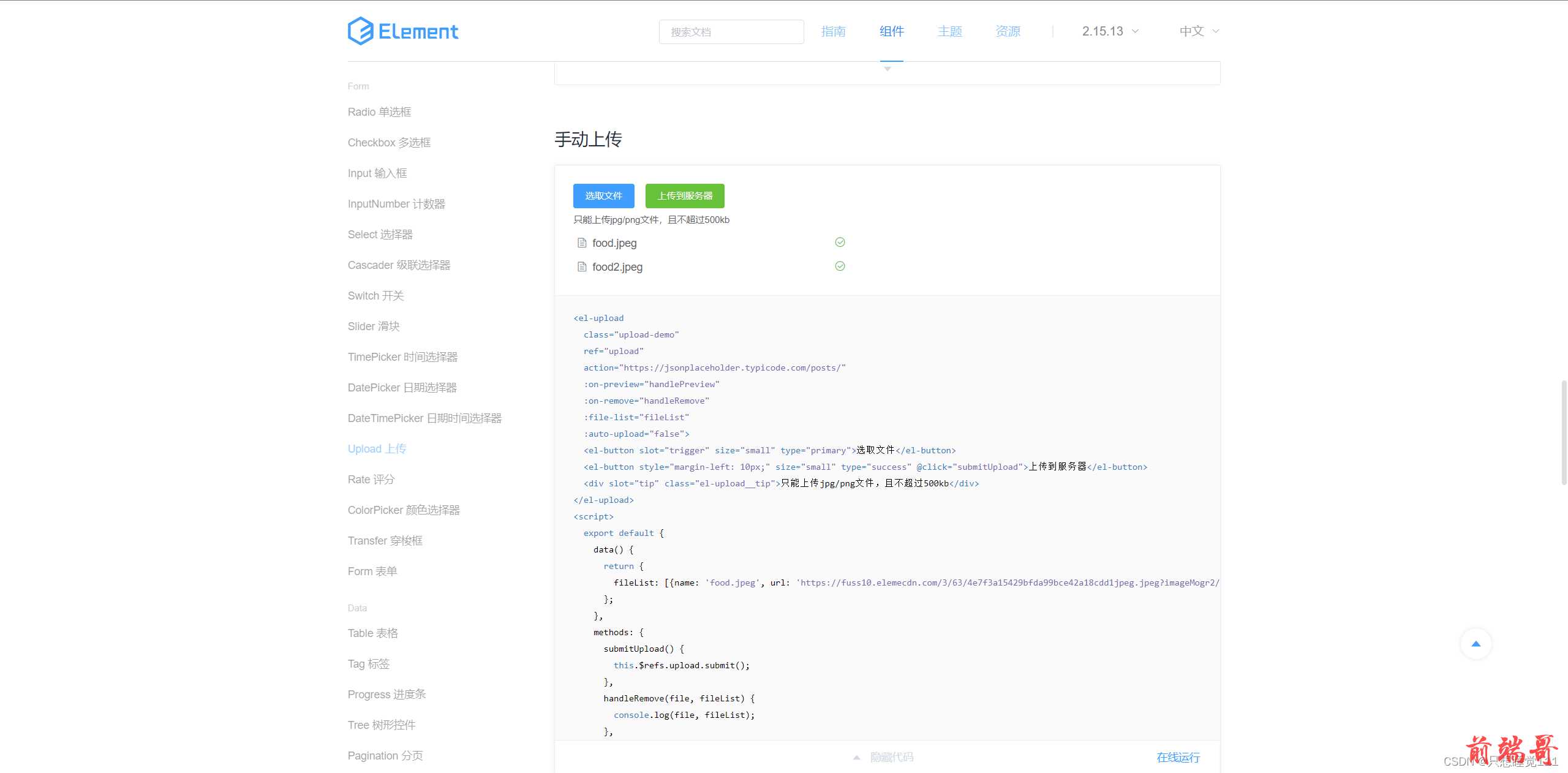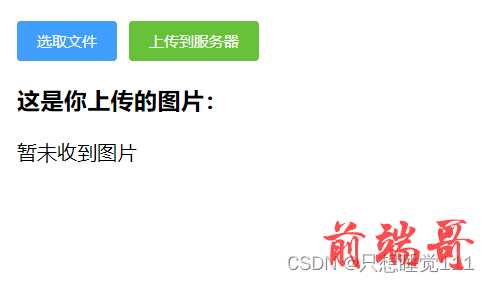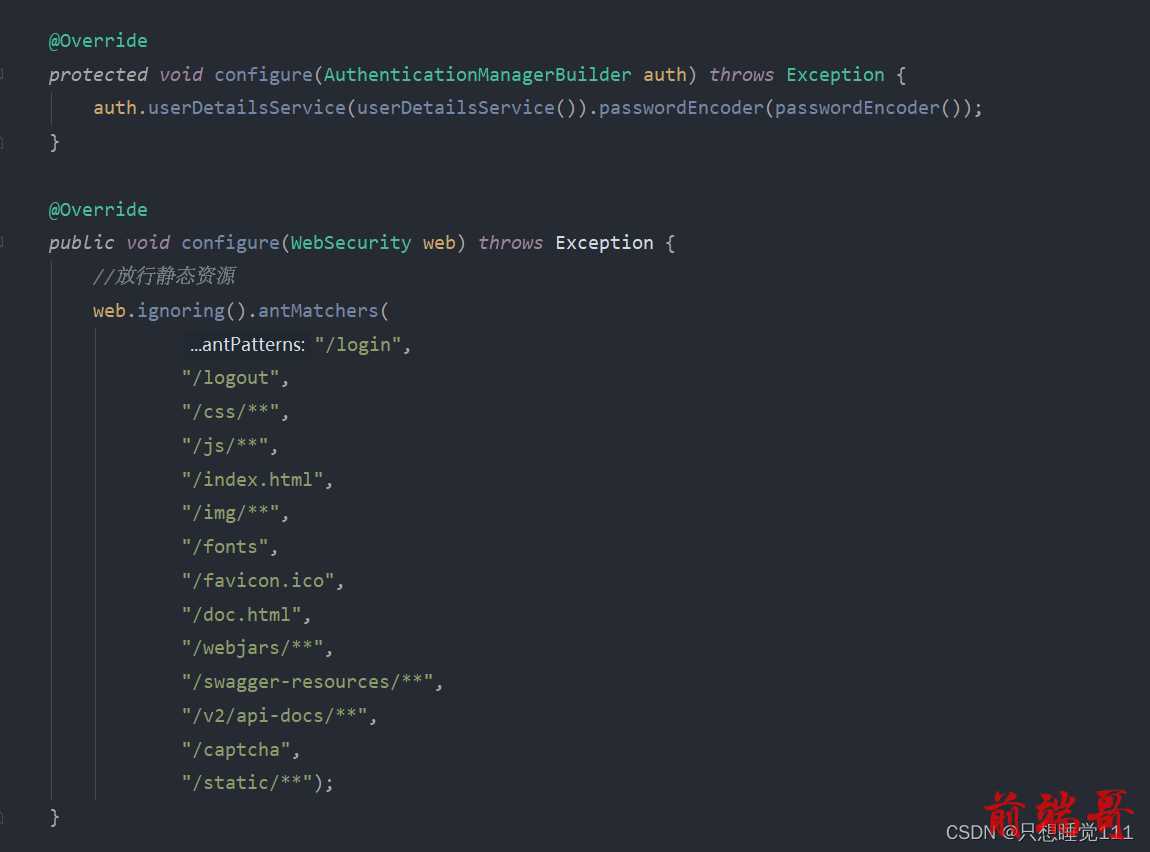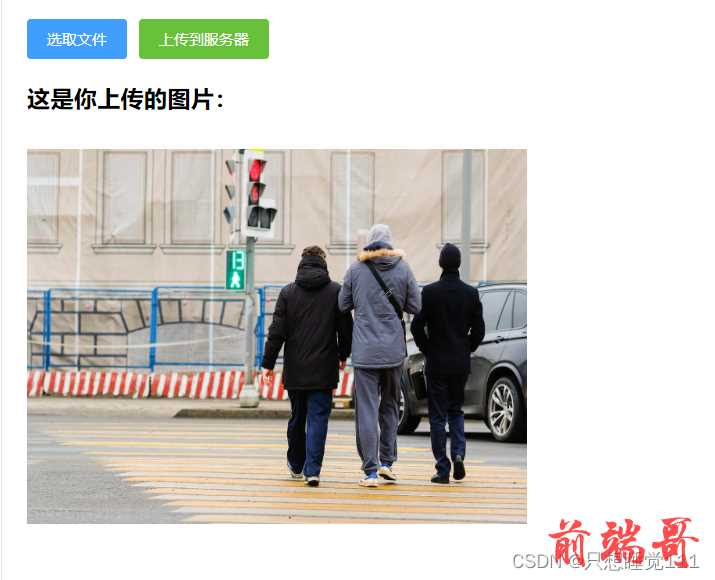这里前端用的是Vue,组件用的是Element-UI。
1.前端
1.1 在Element-UI中找到上传组件

1.2实现前端页面如下所示

1.3 html代码
<template> <div> <div> <el-upload class="upload-demo" ref="upload" action="https://jsonplaceholder.typicode.com/posts/" :http-request="picUpload" :on-success="handleSuccess" multiple :file-list="fileList" :auto-upload="false"> <el-button slot="trigger" size="small" type="primary">选取文件</el-button> <el-button style="margin-left: 10px;" size="small" type="success" @click="submitUpload"> 上传到服务器 </el-button> </el-upload> </div> <div> <h3>这是你上传的图片:</h3> <img v-if="imageUrl!==''" :src="this.hostURL+imageUrl" style="width: 400px; height: 300px; margin-top: 10px"> <span v-else>暂未收到图片</span> </div> </div> </template>
其中hostURL定义在main.js中,使用this调用。
//传输图片添加 Vue.prototype.hostURL = 'http://localhost:8081/static/'
1.4 js代码
我这里因为是测试,而且后端图片都是放在/resources/static下的,所以后端直接给返回了文件名。
后端返回结果如下:
{code: 200, message: '图片传输成功', obj: '2023-05-25-20-02.jpg'}
<script> import axios from "axios"; export default { data() { return { fileList: [], imageUrl: '' } }, methods: { handleSuccess(res, file) { this.imageUrl = URL.createObjectURL(file.raw); }, submitUpload() { this.$refs.upload.submit(); this.fileList = []; }, picUpload(f) { let params = new FormData() //注意在这里一个坑f.file params.append("file", f.file); axios({ method: 'post', //这里的id是我要改变用户的ID值 url: '/upload', data: params, headers: { 'content-type': 'multipart/form-data' } }).then(resp => { //这里返回的是头像的url console.log(resp); this.imageUrl = resp.obj; }) } } } </script>
2.后端
2.1 定义Controller接收/upload请求
这里返回给前端的对象直接放入了新的文件名,后续会将图片名与路径写入数据库中,返回json格式的name与path对象。也可以考虑实现获取所有静态图片的功能,返回一个列表回去。
package com.xxxx.server.controller; import com.xxxx.server.pojo.RespBean; import io.swagger.annotations.ApiOperation; import org.springframework.beans.factory.annotation.Value; import org.springframework.web.bind.annotation.PostMapping; import org.springframework.web.bind.annotation.RequestBody; import org.springframework.web.bind.annotation.RestController; import org.springframework.web.multipart.MultipartFile; import java.io.File; import java.time.LocalDateTime; import java.time.format.DateTimeFormatter; /** * 传送图片 * * @author HuangSJ */ @RestController public class UploadController { @Value("${file.upload-path}") private String imgUrl; @ApiOperation(value = "返回前端发送来的图片") @PostMapping("/upload") public RespBean returnImg(@RequestBody MultipartFile file) { String originalFilename = file.getOriginalFilename(); int index = originalFilename.indexOf("."); String formatFileName = LocalDateTime.now().format(DateTimeFormatter.ofPattern("yyyy-MM-dd-HH-mm")).toString(); String newFileName = formatFileName + originalFilename.substring(index); try { //将文件保存指定目录 file.transferTo(new File(imgUrl + newFileName)); return RespBean.success("图片传输成功", newFileName); } catch (Exception e) { e.printStackTrace(); } return RespBean.error("图片传输出现了错误!"); } }
2.2 Application.yml
新增如下配置,根据个人文件路径修改即可。
file: upload-path: D:/Code/系统/yeb/yeb_back/yeb-server/src/main/resources/static/
2.3 WebConfig.java
保证前端能直接获取后端的静态文件,这里的filePath不定义变量或者定义局部变量都可以。这里主要功能是将包含/static/*的路径映射到本地的静态文件夹static下,保证图片的读取。
package com.xxxx.server.config; import org.springframework.context.annotation.Configuration; import org.springframework.web.servlet.config.annotation.ResourceHandlerRegistry; import org.springframework.web.servlet.config.annotation.WebMvcConfigurer; /** * 实现前端Vue :src 根据url显示头像图片,则必须设置WebMVC中的静态资源配置 */ @Configuration public class WebConfig implements WebMvcConfigurer { private String filePath = "D:/Code/系统/yeb/yeb_back/yeb-server/src/main/resources/static/"; @Override public void addResourceHandlers(ResourceHandlerRegistry registry) { //将前者的路径映射到后者的static路径 registry.addResourceHandler("/static/**").addResourceLocations("file:" + filePath); System.out.println("静态资源获取"); } }
2.4 拦截器问题
如果出现了后端测试功能正常,前端也接收到返回的值,但是获取图片时拿不到数据的情况,可以 考虑一下是不是被拦截了。我这里写了一个SecurityConfig文件,在这里放行一下就可以拿到图片了。

这个是别人那里看到的代码,大家可以根据情况自己修改代码。
package com.bomc.enterprise.config; import com.bomc.enterprise.interceptor.LoginInterceptor; import org.springframework.beans.factory.annotation.Value; import org.springframework.context.annotation.Bean; import org.springframework.context.annotation.Configuration; import org.springframework.web.servlet.config.annotation.*; @Configuration public class WebConfig implements WebMvcConfigurer { @Value("${server.servlet.context-path}") private String contextPath; //不注册这个在过滤器中 service将报空 @Bean public LoginInterceptor loginInterceptor(){ return new LoginInterceptor(); } //添加拦截器方法 @Override public void addInterceptors(InterceptorRegistry registry) { //添加拦截路径 String[] addPathPatters={ "/**" }; //添加不拦截路径 String[] excludePathPatters={ "/", "/login/login", "/login/loginPage","/login/register", "/**/*.css", "/**/*.js", "/**/*.png", "/**/*.jpg", "/**/*.jpeg", "/**/*.gif", "/**/fonts/*", "/**/*.svg", "/**/*.ttf","/**/*.woff","/**/*.eot","/**/*.otf","/**/*.woff2" }; //注册登录拦截器 registry.addInterceptor(loginInterceptor()).addPathPatterns(addPathPatters).excludePathPatterns(excludePathPatters); //如果多条拦截器则增加多条 } //添加放行静态资源 @Override public void addResourceHandlers(ResourceHandlerRegistry registry) { //文件磁盘图片url 映射 //配置server虚拟路径,handler为前台访问的目录,locations为files相对应的本地路径 registry.addResourceHandler("/attachments/**").addResourceLocations("file:E:/东信svn项目/enterprise/code/attachments/"); //配置静态文件路径,与上面并不冲突 registry.addResourceHandler("/**").addResourceLocations("classpath:/META-INF/resources/"); } }
3.结果展示

参考文章
[1]:springboot踩坑三:配置静态资源访问与本地路径的映射
[2]:Springboot+vue 实现图片上传至数据库并显示

